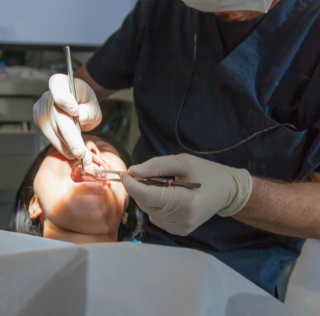ORAL SURGERY
Get Rapid Solution for Excruciating Complications with Oral Surgery
Oral surgery is one of the fastest expanding dental treatments in India. However, there is a poor understanding of the scope of this dental procedure.
At Dr. Gupta’s dental clinic, we attempt to create awareness of each oral disease and the best ways to perform oral surgery. We have a dedicated team of surgeons who engaged themselves in managing in treating defects and injuries of your face, jaw, and teeth. They deal with all the hard and soft tissues of your oral region.
We diagnose, treat, and cure a broad range of conditions with your oral region, and our dentists are highly experienced in handling any case of severe oral surgery in Kandivali West. Our team also helps in educating the patients about the benefit of oral hygiene.
What is "Wisdom Tooth"?
“Wisdom tooth” refers to a back molar that typically emerges after other permanent teeth have already erupted. Often, this happens between the ages of 17 to 40 years old (but not always). These teeth are usually located in the four back corners of your mouth.
When does Wisdom Tooth need removal?
While you usually have about 32 teeth in your mouth, sometimes your jaw can be too small to accommodate them all. If there’s not enough space for a wisdom tooth to come through properly, it may erupt at an angle. Before too long, it can start pushing against an adjacent tooth, causing pain and irritating the cheek and gums. The wisdom tooth will have become an impacted tooth.
Impacted teeth can lead to gum infection, tooth decay, damage to other teeth and even jaw cysts. Sometimes lymph glands under the jaw become swollen and sore as a result of recurring infections. Extraction of the wisdom tooth or teeth may be the best solution. Generally, upper wisdom teeth tend to be easier to remove than lower ones, and they are more likely to be impacted.

How does the dentist know if an extraction is needed?
However, if there’s any discomfort or you find it difficult to open your mouth, a wisdom tooth may be impacted under the gums. We take a full mouth x-ray OPG, which is in the house to find out if the impacted wisdom tooth needs to be extracted. Sometimes, all that’s needed is a small cut in the gums to help the wisdom tooth come through. We can explain your options and recommend a full treatment plan based on your needs.
Does removal happen in a dental chair or at a hospital?
However, if it’s a complex case due to the position or shape of the roots, your dentist may refer you to a specialist oral surgeon. The wisdom tooth extraction is done by specialists or Oral Surgeons. Your appointment will be scheduled according to your convenience with the Oral Surgeons. Almost 99 percent of the wisdom tooth removal is done in a routine dental chair under local anesthesia.
What other problems can wisdom teeth cause?
Some wisdom teeth grow through the gum, breaking the surface but not fully erupting. This can cause problems, including something called pericoronitis: swollen, irritated or infected gum tissue that surrounds the partially erupted tooth. Symptoms of pericoronitis can include pain, swelling or a bad taste in your mouth.
Sometimes, wisdom teeth grow into spots that make them extraordinarily difficult to clean, heightening your risk of decay and gum disease. If that’s the case, or if the tooth has already undergone decay, your dentist may recommend extraction.
Recovery Time
We will explain instructions for recovery and what you can expect based on your procedure and circumstances. They’ll advise you on recovery and possible side effects – this should happen before removal.
Wisdom teeth tend to be large, so you may need stitches after they’re removed. Removal may cause swelling or some bleeding for the first few days, but over-the-counter painkillers, such as paracetamol or ibuprofen, can help alleviate the pain. We will provide instructions; don’t hesitate to ask for take-home material like a pamphlet or print-out that explains recovery instructions, or ask for a number you can call if you have questions about your recovery.
FREQUENTLY ASKED QUESTIONS :
Dr. Rashi and Dr. Sachin performed all difficult surgeries painlessly, swiftly and efficiently.

Book Your Appointment

